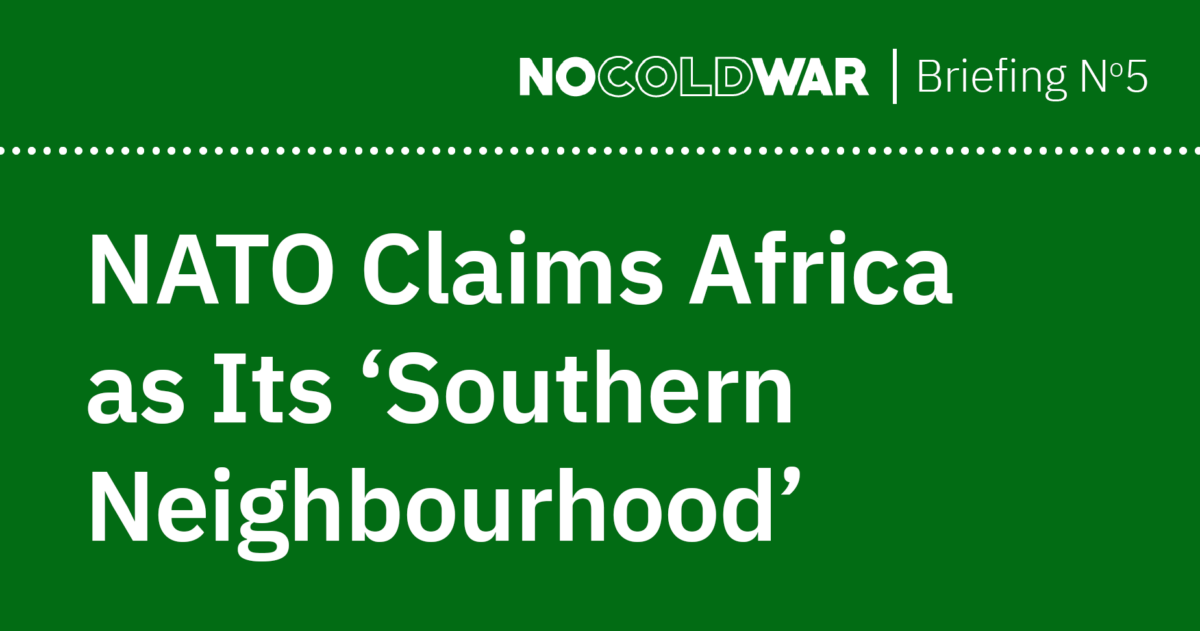The New Cold War is rapidly heating up, with severe consequences for people around the world. Our series, Briefings, provides the key facts on these matters of global concern.
 English | Español | Português
English | Español | Português
In August 2022, the United States published a new foreign policy strategy aimed at Africa. The 17-page document featured 10 mentions of China and Russia combined, including a pledge to ‘counter harmful activities by the [People’s Republic of China], Russia, and other foreign actors’ on the continent, but did not once mention the term ‘sovereignty’. Although US Secretary of State Antony Blinken has stated that Washington ‘will not dictate Africa’s choices’, African governments have reported facing ‘patronising bullying’ from NATO member states to take their side in the war in Ukraine. As global tensions rise, the US and its allies have signalled that they view the continent as a battleground to wage their New Cold War against China and Russia.
A New Monroe Doctrine?
At its annual summit in June, NATO named Africa along with the Middle East as ‘NATO’s southern neighbourhood’. On top of this, NATO’s Secretary General Jens Stoltenberg ominously referred to ‘Russia and China’s increasing influence in our southern neighbourhood’ as a ‘challenge’. The following month, the outgoing commander of AFRICOM, General Stephen J Townsend, referred to Africa as ‘NATO’s southern flank’. These comments are disturbingly reminiscent of the neocolonial attitude espoused by the Monroe Doctrine of 1823, in which the US claimed Latin America as its ‘backyard’.
This paternalistic view of Africa appears to be widely held in Washington. In April, the US House of Representatives overwhelmingly passed the Countering Malign Russian Influence Activities in Africa Act by a vote of 415-9. The bill, which aims to punish African governments for not aligning with US foreign policy on Russia, has been widely condemned across the continent for disrespecting the sovereignty of African nations, with South African Foreign Minister Naledi Pandor calling it ‘absolutely disgraceful’.
The efforts by the US and Western countries to draw Africa into their geopolitical conflicts raise serious concerns: namely, will the US and NATO weaponise their vast military presence on the continent to achieve their aims?
AFRICOM: Protecting US and NATO’s Hegemony
In 2007, the United States established its Africa Command (AFRICOM) ‘in response to our expanding partnerships and interests in Africa’. In just 15 years, AFRICOM has established at least 29 military bases on the continent as part of an extensive network which includes more than 60 outposts and access points in at least 34 countries – over 60 percent of the nations on the continent.
Despite Washington’s rhetoric of promoting democracy and human rights in Africa, in reality, AFRICOM aims to secure US hegemony over the continent. AFRICOM’s stated objectives include ‘protecting US interests’ and ‘maintaining superiority over competitors’ in Africa. In fact, the creation of AFRICOM was motivated by the concerns of ‘those alarmed by China’s expanding presence and influence in the region’.
From the outset, NATO was involved in the endeavour, with the original proposal put forward by then Supreme Allied Commander of NATO James L Jones, Jr. On an annual basis, AFRICOM conducts training exercises focused on enhancing the ‘interoperability’ between African militaries and ‘US and NATO special operations forces’.
The destructive nature of the US and NATO’s military presence in Africa was exemplified in 2011 when – ignoring the African Union’s opposition – the US and NATO launched their catastrophic military intervention in Libya to remove the government of Muammar Gaddafi. This regime change war destroyed the country, which had previously scored the highest among African nations on the UN Human Development Index. Over a decade later, the principal achievements of the intervention in Libya have been the return of slave markets to the country, the entry of thousands of foreign fighters, and unending violence.
In the future, will the US and NATO invoke the ‘malign influence’ of China and Russia as a justification for military interventions and regime change in Africa?
Africa Rejects a New Cold War
At this year’s UN General Assembly, the African Union firmly rejected the coercive efforts of the US and Western countries to use the continent as a pawn in their geopolitical agenda. ‘Africa has suffered enough of the burden of history’, stated Chairman of the African Union and President of Senegal Macky Sall; ‘it does not want to be the breeding ground of a new Cold War, but rather a pole of stability and opportunity open to all its partners, on a mutually beneficial basis’. Indeed, the drive for war offers nothing to the peoples of Africa in their pursuit of peace, climate change adaptation, and development.
